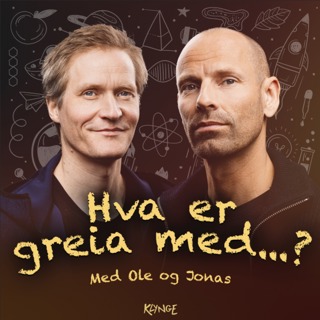
162 | Leidy Klotz on Our Resistance to Subtractive Change
There is no general theory of problem-solving, or even a reliable set of principles that will usually work. It’s therefore interesting to see how our brains actually go about solving problems. Here’s an interesting feature that you might not have guessed: when faced with an imperfect situation, our first move to improve it tends to involve adding new elements, rather than taking away. We are, in general, resistant to subtractive change. Leidy Klotz is an engineer and designer who has worked with psychologists and neuroscientists to study this phenomenon. We talk about how our relative blindness to subtractive possibilities manifests itself, and what lessons might be for design more generally.Support Mindscape on Patreon.Leidy Klotz received his Ph.D. in Architectural Engineering from Penn State University. He is currently Copenhaver Associate Professor of Engineering Systems and Environment and Architecture at the University of Virginia. Before becoming a professor, he worked as a school designer, and before that was a professional soccer player for the Pittsburgh Riverhounds. His new book is Subtract: The Untapped Science of Less.Web siteUniversity of Virginia web pageGoogle Scholar publications“People Systematically Overlook Subtractive Changes,” Adams, Converse, Hales and Klotz, 2021.WikipediaTwitterSee Privacy Policy at https://art19.com/privacy and California Privacy Notice at https://art19.com/privacy#do-not-sell-my-info.
30 Aug 20211h 14min

161 | W. Brian Arthur on Complexity Economics
Economies in the modern world are incredibly complex systems. But when we sit down to think about them in quantitative ways, it’s natural to keep things simple at first. We look for reliable relations between small numbers of variables, seek equilibrium configurations, and so forth. But those approaches don’t always work in complex systems, and sometimes we have to use methods that are specifically adapted to the challenges of complexity. That’s the perspective of W. Brian Arthur, a pioneer in the field of complexity economics, according to which economies are typically not in equilibrium, not made of homogeneous agents, and are being constantly updated. We talk about the basic ideas of complexity economics, how it differs from more standard approaches, and what it teaches us about the operation of real economies.Support Mindscape on Patreon.W. Brian Arthur received his Ph.D. in operations research from the University of California, Berkeley. He is currently an External Faculty Member at the Santa Fe Institute, IBM Faculty Fellow, and Visiting Researcher in the Intelligent Systems Lab at PARC. He was formerly the Morrison Professor of Economics and Population Studies and Professor of Biology at Stanford. He is known for developing the theory of increasing returns in economics. Among his awards are a Guggenheim Fellowship, the Schumpeter Prize in economics, and the Lagrange Prize for complexity.Web siteSanta Fe web pageGoogle Scholar publicationsWikipediaAmazon author pageSee Privacy Policy at https://art19.com/privacy and California Privacy Notice at https://art19.com/privacy#do-not-sell-my-info.
23 Aug 20211h 35min

160 | Edward Slingerland on Confucianism, Daoism, and Wu Wei
Plato and Aristotle founded much of what we think of as Western philosophy during the fourth and fifth centuries BCE. Interestingly, that historical period also witnessed the foundation of some of the major schools of Chinese philosophy, especially Confucianism and Daoism. This is a long-overdue discussion of ancient Chinese ideas, featuring philosopher and religious-studies scholar Edward Slingerland. We talk about the relationship between these two schools of thought, and their differences and similarities with Western philosophy. One of the biggest ideas is wu wei, or “effortless action” — the way that true mastery consists of doing things without too much conscious control. Today we would call it “flow” or “being in the zone,” but the idea stretches back quite a ways.Support Mindscape on Patreon.Edward Slingerland received his Ph.D. in religious studies from Stanford. He is currently Distinguished University Scholar, Professor of Philosophy, and Associate Member of the departments of Asian Studies and Psychology at the University of British Columbia. He is Director of the Database of Religious History, and co-director of the Center for the Study of Human Evolution, Cognition, and Culture. Among his books are Trying Not to Try: Ancient China, Modern Science, and the Power of Spontaneity, and a translation of Confucius’s Analects. His new book is Drunk: How We Sipped, Danced, and Stumbled Our Way to Civilization.Web siteUBC web pageGoogle Scholar publicationsAmazon.com author pageWikipediaTwitterSee Privacy Policy at https://art19.com/privacy and California Privacy Notice at https://art19.com/privacy#do-not-sell-my-info.
16 Aug 20211h 23min

AMA | August 2021
Welcome to the August 2021 Ask Me Anything episode of Mindscape! These monthly excursions are funded by Patreon supporters (who are also the ones asking the questions). I take the large number of questions asked by Patreons, whittle them down to a more manageable size — based primarily on whether I have anything interesting to say about them, not whether the questions themselves are good — and sometimes group them together if they are about a similar topic. Enjoy!Support Mindscape on Patreon.See Privacy Policy at https://art19.com/privacy and California Privacy Notice at https://art19.com/privacy#do-not-sell-my-info.
12 Aug 20213h 11min

159 | Mari Ruti on Lack, Love, and Psychoanalysis
Neuroscience has given us great insights into how our brains work. But there is still room for purely humanistic disciplines to help us think through our thoughts and emotions, not to mention the meaning of our lives. Mari Ruti is a professor of English literature, with expertise in critical theory, gender studies, and psychoanalysis, especially the work of French theorist Jacques Lacan. We talk about the psychological drive that is motivated by what Lacan calls “lack,” which is related to “desire.” We use this as a way to think about such essential human experiences as mourning, creativity, and love. (We don’t talk about love enough here on the podcast.)Support Mindscape on Patreon.Mari Ruti received her Ph.D. in comparative literature from Harvard University. She is currently a Distinguished Professor of critical theory and gender and sexuality studies at the University of Toronto. She is the co-editor of the Psychoanalytic Horizons book series for Bloomsbury.U Toronto web pageAmazon.com author pageSemantic scholarWikipediaTwitterSee Privacy Policy at https://art19.com/privacy and California Privacy Notice at https://art19.com/privacy#do-not-sell-my-info.
9 Aug 20211h 49min

158 | David Wallace on the Arrow of Time
The arrow of time — all the ways in which the past differs from the future — is a fascinating subject because it connects everyday phenomena (memory, aging, cause and effect) to deep questions in physics and philosophy. At its heart is the fact that entropy increases over time, which in turn can be traced to special conditions in the early universe. David Wallace is one of the world’s leading philosophers working on the foundations of physics, including space and time as well as quantum mechanics. We talk about how increasing entropy gives rise to the arrow of time, and what it is about the early universe that makes this happen. Then we cannot help but connecting this story to features of the Many-Worlds (Everett) interpretation of quantum mechanics.Support Mindscape on Patreon.David Wallace received a D.Phil. in Physics and a D.Phil. in Philosophy from Oxford University. He is currently W.A. Mellon Professor of Philosophy of Science, with joint appointments in the Philosophy Department and the Department of History and Philosophy of Science, at the University of Pittsburgh. He is the author of The Emergent Multiverse: Quantum Theory According to the Everett Interpretation. Among his honors are the Lakatos Award for outstanding contribution to the philosophy of science. His most recent book is Philosophy of Physics: A Very Short Introduction.Web sitePhilPeople profileGoogle Scholar publicationsAmazon.com author pageSee Privacy Policy at https://art19.com/privacy and California Privacy Notice at https://art19.com/privacy#do-not-sell-my-info.
2 Aug 20211h 47min

157 | Elizabeth Strychalski on Synthetic Cells and the Rules of Biology
Natural selection has done a pretty good job at creating a wide variety of living species, but we humans can’t help but wonder whether we could do better. Using existing genomes as a starting point, biologists are getting increasingly skilled at designing organisms of our own imagination. But to do that, we need a better understanding of what different genes in our DNA actually do. Elizabeth Strychalski and collaborators recently announced the construction of a synthetic microbial organism that self-reproduces just like a normal unicellular creature. This work will help us understand the roles of genes in reproduction, one step on the road to making DNA molecules and artificial cells that will perform a variety of medical and biological tasks.Support Mindscape on Patreon.Elizabeth Strychalski received her Ph.D. in physics from Cornell University. She is the founder and current leader of the Cellular Engineering Group at the National Institute of Standards and Technology. She serves on the steering group for the Build-A-Cell collaboration.NIST web pageGoogle Scholar publicationsTalk on Controlling Biology with Complexity“Genetic requirements for cell division in a genomically minimal cell,” Pelletier et al.See Privacy Policy at https://art19.com/privacy and California Privacy Notice at https://art19.com/privacy#do-not-sell-my-info.
26 Jul 20211h 17min

156 | Catherine D’Ignazio on Data, Objectivity, and Bias
How can data be biased? Isn’t it supposed to be an objective reflection of the real world? We all know that these are somewhat naive rhetorical questions, since data can easily inherit bias from the people who collect and analyze it, just as an algorithm can make biased suggestions if it’s trained on biased datasets. A better question is, how do biases creep in, and what can we do about them? Catherine D’Ignazio is an MIT professor who has studied how biases creep into our data and algorithms, and even into the expression of values that purport to protect objective analysis. We discuss examples of these processes and how to use data to make things better.Support Mindscape on Patreon.Catherine D’Ignazio received a Master of Fine Arts from Maine College of Art and a Master of Science in Media Arts and Sciences from the MIT Media Lab. She is currently an assistant professor of Urban Science and Planning and Director of the Data+Feminism Lab at MIT. She is the co-author, with Lauren F. Klein, of the book Data Feminism.Web siteMIT web pageGoogle Scholar publicationsData + Feminism LabWikipediaTwitterSee Privacy Policy at https://art19.com/privacy and California Privacy Notice at https://art19.com/privacy#do-not-sell-my-info.
19 Jul 20211h 28min




















